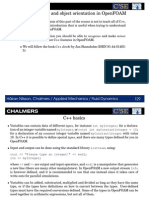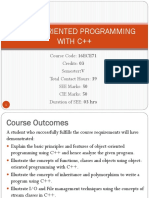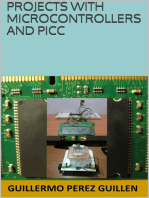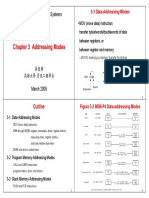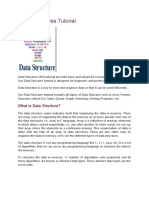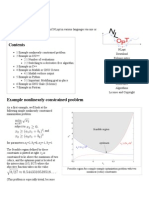Basics of C++ in Openfoam: Håkan Nilsson 1
Uploaded by
dfi49965Basics of C++ in Openfoam: Håkan Nilsson 1
Uploaded by
dfi49965CFD with OpenSource Software, 2019
Basics of C++ in OpenFOAM
Håkan Nilsson, Chalmers / Mechanics and Maritime Sciences / Fluid Dynamics 1
CFD with OpenSource Software, 2019
Basics of C++ in OpenFOAM
Prerequisites
• You have some programming experience.
• You have experience in working in Linux.
Learning outcomes
• You will learn the basic syntax in C++
• You will learn how to use classes to implement simple C++ codes, and how member functions
are called in the top-level code.
• You will learn how to implement functions in the top-level code, understand the difference
between declaration and definition, and see how that can be practically used.
• You will learn how OpenFOAM compilation relates to compilation of a simple C++ code.
Note that you will be asked to pack up your final cleaned-up directories and submit them for
assessment of completion.
Håkan Nilsson, Chalmers / Mechanics and Maritime Sciences / Fluid Dynamics 2
CFD with OpenSource Software, 2019
Basics of C++ in OpenFOAM
• To begin with: The aim of this part of the course is not to teach all of C++,
but to give a short introduction that is useful when trying to understand
the contents of OpenFOAM.
• After this introduction you should be able to recognize and make minor
modifications to most C++ features in OpenFOAM.
• Some books:
– C++ direkt by Jan Skansholm (ISBN 91-44-01463-5)
– C++ from the Beginning by Jan Skansholm (probably similar)
– C++ how to Program by Paul and Harvey Deitel
– Object Oriented Programming in C++ by Robert Lafore
Håkan Nilsson, Chalmers / Mechanics and Maritime Sciences / Fluid Dynamics 3
CFD with OpenSource Software, 2019
C++ basics – types
• Variables can contain data of different types, for instance:
int myInteger;
for a declaration of an integer variable named myInteger, or
const int myConstantInteger = 10;
for a declaration of an constant integer variable named myConstantInteger with value
10.
• Variables can be added, substracted, multiplied and divided as long as they have the same
type, or if the types have definitions on how to convert between the types.
• In C++ it is possible to define special types (classes), and there are many types defined for
you in OpenFOAM.
• User-defined types must have the required conversions defined. Some of the types in Open-
FOAM can be used together in arithmetic expressions, but not all of them.
Håkan Nilsson, Chalmers / Mechanics and Maritime Sciences / Fluid Dynamics 4
CFD with OpenSource Software, 2019
C++ basics – Namespace
• When using pieces of C++ code developed by different programmers there is a risk that the
same name has been used for different things.
• By associating a declaration with a namespace, the declaration will only be visible if that
namespace is used. The standard declarations are used by starting with:
using namespace std;
• OpenFOAM declarations belong to namespace Foam, so in OpenFOAM we use:
using namespace Foam;
to make all declarations in namespace Foam visible.
• Explicit naming in OpenFOAM:
Foam::function();
where function() is a function defined in namespace Foam. This must be used if any other
namespace containing a declaration of another function() is also visible.
Håkan Nilsson, Chalmers / Mechanics and Maritime Sciences / Fluid Dynamics 5
CFD with OpenSource Software, 2019
C++ basics – input/output
• Input and output can be done using the standard library iostream, using:
cout << "Please type an integer!" << endl;
cin >> myInteger;
where << and >> are output and input operators, and endl is a manipulator that generates
a new line (there are many other manipulators).
• In OpenFOAM a new output stream Info is however defined, and it is recommended to use
that one instead since it takes care of write-outs for parallel simulations.
Håkan Nilsson, Chalmers / Mechanics and Maritime Sciences / Fluid Dynamics 6
CFD with OpenSource Software, 2019
C++ basics, main function
• All C++ codes must have at least one function:
int main()
{
return 0;
}
in this case, main takes no arguments, but it may (as in OpenFOAM applications).
• The main function should always return an integer, and default is 0, so for the main function
it is allowed to write only:
main()
{
}
• Code appearing after the return statement is not executed!!!
Håkan Nilsson, Chalmers / Mechanics and Maritime Sciences / Fluid Dynamics 7
CFD with OpenSource Software, 2019
C++ basics, Example code
In file basic1.C:
#include <iostream>
using namespace std;
main()
{
int myInteger;
const int constantInteger=5;
const float constantFloat=5.1;
cout << "Please type an integer!" << endl;
cin >> myInteger;
cout << myInteger << " + " << constantInteger << " = "
<< myInteger+constantInteger << endl;
cout << myInteger << " + " << constantFloat << " = "
<< myInteger+constantFloat << endl;
}
Compile and run with:
g++ basic1.C -o basic1;
./basic1
Håkan Nilsson, Chalmers / Mechanics and Maritime Sciences / Fluid Dynamics 8
CFD with OpenSource Software, 2019
C++ basics – operators
• +, -, * and / are operators that define how the operands should be used.
• Other standard operators are:
% (integer division modulus)
++ (add 1)
-- (substract 1)
+= (i+=2 adds 2 to i)
-= (i-=2 subtracts 2 from i)
*= (i*=2 multiplies i by 2)
/= (i/=2 divides i by 2)
etc. User-defined types should define its operators.
• Comparing operators: < > <= >= == != Generates bool (boolean)
• Logical operators: && || ! (or, for some compilers: and or not). Generates
bool (boolean)
Håkan Nilsson, Chalmers / Mechanics and Maritime Sciences / Fluid Dynamics 9
CFD with OpenSource Software, 2019
C++ basics – functions
• Mathematic standard functions are available in standard libraries. They are thus not part
of C++ itself.
• Standard library cmath contains trigonometric functions, logaritmic functions and square
root. (use #include cmath; if you need them)
• Standard library cstdlib contains general functions, and some of them can be used for
arithmetics. (use #include cstdlib; if you need them)
Håkan Nilsson, Chalmers / Mechanics and Maritime Sciences / Fluid Dynamics 10
CFD with OpenSource Software, 2019
C++ basics – if, for and while-statements
• if-statements:
if (variable1 > variable2) {...CODE...} else {...CODE...}
• for-statements:
for ( init; condition; change ) {...CODE...}
• while-statements:
while (...expression...) {...CODE...}
break; breaks the execution of while
Håkan Nilsson, Chalmers / Mechanics and Maritime Sciences / Fluid Dynamics 11
CFD with OpenSource Software, 2019
C++ basics, Example code
In file basic2.C:
#include <iostream>
#include <cmath>
using namespace std;
main()
{
float myFloat;
cout << "Please type a float!" << endl;
cin >> myFloat;
cout << "sin(" << myFloat << ") = " << sin(myFloat) << endl;
if (myFloat < 5.5){cout << myFloat << " is less than 5.5" << endl;} else
{cout << myFloat << " is not less than 5.5" << endl;};
for ( int i=0; i<myFloat; i++ ) {cout << "For-looping: " << i << endl;}
int j=0;
while (j<myFloat) {cout << "While-looping: " << j << endl; j++;}
} //Note conversion of myFloat to int in loops!
Compile and run with:
g++ basic2.C -o basic2; ./basic2
Håkan Nilsson, Chalmers / Mechanics and Maritime Sciences / Fluid Dynamics 12
CFD with OpenSource Software, 2019
C++ basics – arrays
• Arrays:
double f[5]; (Note: components numbered from 0!)
f[3] = 2.75; (Note: no index control!)
int a[6] = {2, 2, 2, 5, 5, 0}; (declaration and initialization)
The arrays have strong limitations, but serve as a base for array templates
• Array templates (example vector. other: list, deque):
#include <vector>
using namespace std
The type of the vector must be specified upon declaration:
vector<double> v2(3); gives {0, 0, 0}
vector<double> v3(4, 1.5); gives {1.5, 1.5, 1.5, 1.5}
vector<double> v4(v3); Constructs v4 as a copy of v3 (copy-constructor)
• Array template operations: The template classes define member functions that can be used
for those types, for instance: size(), empty(), assign(), push_back(), pop_back(),
front(), clear(), capacity() etc.
v.assign(4, 1.0); gives {1.0, 1.0, 1.0, 1.0}
Håkan Nilsson, Chalmers / Mechanics and Maritime Sciences / Fluid Dynamics 13
CFD with OpenSource Software, 2019
C++ basics, Example code
In file basic3.C:
#include <iostream>
#include <vector>
using namespace std;
main()
{
vector<double> v2(3);
vector<double> v3(4, 1.5);
vector<double> v4(v3);
cout << "v2: (" << v2[0] << "," << v2[1] << "," << v2[2] << ")" << endl;
cout << "v3: (" << v3[0] << "," << v3[1] << "," << v3[2] << "," << v3[3] << ")" << endl;
cout << "v4: (" << v4[0] << "," << v4[1] << "," << v4[2] << "," << v4[3] << ")" << endl;
cout << "v2.size(): " << v2.size() << endl;
}
Compile and run with:
g++ basic3.C -o basic3; ./basic3
Note that the standard vector class is not implemented to be able to execute:
cout << "v2: " << v2 << endl;
Such functionality is available in OpenFOAM.
Håkan Nilsson, Chalmers / Mechanics and Maritime Sciences / Fluid Dynamics 14
CFD with OpenSource Software, 2019
C++ basics – function implementation
• Example function named average
double average (double x1, double x2)
{
int nvalues = 2;
return (x1+x2)/nvalues;
}
takes two arguments of type double, and returns type double. The variable nvalues is a
local variable, and is only visible inside the function. Note that any code after the return
statement will not be executed.
• A function doesn’t have to take arguments, and it doesn’t have to return anything (the
output type is then specified as void).
• There may be several functions with the same names, as long as there is a difference in the
arguments to the functions - the number of arguments or the types of the arguments.
• Functions must be declared before they are used.
Håkan Nilsson, Chalmers / Mechanics and Maritime Sciences / Fluid Dynamics 15
CFD with OpenSource Software, 2019
C++ basics, Example code
In file basic4.C:
#include <iostream>
using namespace std;
double average (double x1, double x2)
{
int nvalues = 2;
return (x1+x2)/nvalues;
}
main()
{
double d1=2.1;
double d2=3.7;
cout << "Average: " << average(d1,d2) << endl;
}
Compile and run with:
g++ basic4.C -o basic4; ./basic4
Håkan Nilsson, Chalmers / Mechanics and Maritime Sciences / Fluid Dynamics 16
CFD with OpenSource Software, 2019
C++ basics – declaration and definition of functions
• The function declaration must be done before it is used, but the function definition can
be done after it is used. Example:
double average (double x1, double x2); //Declaration
main ()
{
mv = average(value1, value2)
}
double average (double x1, double x2) //Definition
{
return (x1+x2)/2;
}
The argument names may be omitted in the declaration.
• Declarations are often included from include-files:
#include "file.h"
#include <standardfile>
• A good way to program C++ is to make files in pairs, one with the declaration, and one
with the definition. This is done throughout OpenFOAM.
Håkan Nilsson, Chalmers / Mechanics and Maritime Sciences / Fluid Dynamics 17
CFD with OpenSource Software, 2019
C++ basics, Example code
In file basic5.C:
#include <iostream>
#include "basic5.H"
using namespace std;
main()
{
double d1=2.1;
double d2=3.7;
cout << "Average: " << average(d1,d2) << endl;
}
double average (double x1, double x2)
{
int nvalues = 2;
return (x1+x2)/nvalues;
}
In file basic5.H:
double average (double, double);
Compile and run with: g++ basic5.C -o basic5; ./basic5
Håkan Nilsson, Chalmers / Mechanics and Maritime Sciences / Fluid Dynamics 18
CFD with OpenSource Software, 2019
C++ basics – function parameters / arguments
reference and default value
• If an argument variable should be changed inside a function, the type of the argument must
be a reference, i.e.
void change(double& x1)
The reference parameter x1 will now be a reference to the argument to the function in-
stead of a local variable in the function. (standard arrays are always treated as reference
parameters).
• Reference parameters can also be used to avoid copying of large fields when calling a func-
tion. To avoid changing the parameter in the function it can be declared as const, i.e.
void checkWord(const string& s)
This often applies for parameters of class-type, which can be large.
• Default values can be specified, and then the function may be called without that parameter,
i.e.
void checkWord(const string& s, int nmbr=1)
Håkan Nilsson, Chalmers / Mechanics and Maritime Sciences / Fluid Dynamics 19
CFD with OpenSource Software, 2019
C++ basics, Example code
In file basic6.C:
#include <iostream>
using namespace std;
double average (double& x1, double& x2, int nvalues=2)
{
x1 = 7.5;
return (x1+x2)/nvalues;
}
main()
{
double d1=2.1;
double d2=3.7;
cout << "Modified average: " << average(d1,d2) << endl;
cout << "Half modified average: " << average(d1,d2,4) << endl;
cout << "d1: " << d1 << ", d2: " << d2 << endl;
}
Compile and run with: g++ basic6.C -o basic6; ./basic6
Håkan Nilsson, Chalmers / Mechanics and Maritime Sciences / Fluid Dynamics 20
CFD with OpenSource Software, 2019
C++ basics – Pointers
• Pointers point at a memory location (while a reference is referring to another variable, as
shown before, i.e. they are different). Example (in basic7.C):
#include <iostream>
using namespace std;
main()
{
double d1=2.1;
double d2=3.7;
double* d3; //d3 is a pointer, currently not pointing at anything
d3 = &d1; //Now d3 points at the memory location of d1
cout << "d1: " << d1 << endl;
cout << "d2: " << d2 << endl;
cout << "d3: " << d3 << endl;
cout << "*d3: " << *d3 << endl;
d3 = &d2; //Now d3 points at the memory location of d2
cout << "d3: " << d3 << endl;
cout << "*d3: " << *d3 << endl;
}
Compile and run with: g++ basic7.C -o basic7; ./basic7
Håkan Nilsson, Chalmers / Mechanics and Maritime Sciences / Fluid Dynamics 21
CFD with OpenSource Software, 2019
Pointers for turbulence models
• Turbulence models are treated with the turbulence pointer in OpenFOAM.
In file:$FOAM_SOLVERS/incompressible/simpleFoam/createFields.H:
autoPtr<incompressible::turbulenceModel> turbulence
(
incompressible::turbulenceModel::New(U, phi, laminarTransport)
);
In file $FOAM_SOLVERS/incompressible/simpleFoam/simpleFoam.C:
turbulence->correct();
Håkan Nilsson, Chalmers / Mechanics and Maritime Sciences / Fluid Dynamics 22
CFD with OpenSource Software, 2019
C++ basics – Types
• Types define what values a variable may obtain, and what operations may be made on the
variable.
• Pre-defined C++ types are:
signed char unsigned int
short int unsigned long int
int float
unsigned char double
unsigned short int long double
• User defined types can be defined in classes. OpenFOAM provides many types/classes that
are useful for solving partial differential equations.
• OpenFOAM classes are used by including the class declarations in the header of the code,
and linking to the corresponding compiled OpenFOAM library at compilation.
• The path to included files that are in another path than the current directory must be
specified by -I
• The path to libraries that are linked to is specified with -L
Håkan Nilsson, Chalmers / Mechanics and Maritime Sciences / Fluid Dynamics 23
CFD with OpenSource Software, 2019
C++ basics, Example code
In file basic8.C:
#include <iostream> //Just for cout
using namespace std; //Just for cout
#include "tensor.H" //From OpenFOAM
#include "symmTensor.H" //From OpenFOAM
using namespace Foam; //From OpenFOAM
int main()
{ tensor t1(1, 2, 3, 4, 5, 6, 7, 8, 9); //From OpenFOAM
cout << "t1[0]: " << t1[0] << endl;
symmTensor st1(1, 2, 3, 4, 5, 6); //From OpenFOAM
cout << "st1[5]: " << st1[5] << endl;
return 0;}
Compile and run with (some trial-and-error, looking at output from wmake for test/tensor):
g++ -std=c++0x basic8.C -DWM_DP -DWM_LABEL_SIZE=32 -I$FOAM_SRC/OpenFOAM/lnInclude \
-L$WM_PROJECT_DIR/lib/$WM_OPTIONS/libOpenFOAM.so -o basic8; ./basic8
Here, -DWM_DP is for double precision floats and -DWM_LABEL_SIZE=32 is for 32 bit int.
We include header files (declarations) from $FOAM_SRC/OpenFOAM/lnInclude
We link to library (definitions) $WM_PROJECT_DIR/lib/$WM_OPTIONS/libOpenFOAM.so
Håkan Nilsson, Chalmers / Mechanics and Maritime Sciences / Fluid Dynamics 24
You might also like
- Padma Reddy - Data Structures and Applications - A Simple and Systematic Approach90% (10)Padma Reddy - Data Structures and Applications - A Simple and Systematic Approach613 pages
- A Practical File of Data Structure Lab BCA-206: Session: 2020-21100% (1)A Practical File of Data Structure Lab BCA-206: Session: 2020-2134 pages
- Nokia VP8 Infringement Claim Chart For '211 PatentNo ratings yetNokia VP8 Infringement Claim Chart For '211 Patent37 pages
- Basics of C++ in Openfoam: ©håkan Nilsson, Chalmers / Applied Mechanics / Fluid Dynamics 1No ratings yetBasics of C++ in Openfoam: ©håkan Nilsson, Chalmers / Applied Mechanics / Fluid Dynamics 122 pages
- Object Orientation in C++ and Openfoam: Håkan Nilsson 1No ratings yetObject Orientation in C++ and Openfoam: Håkan Nilsson 135 pages
- Object Orientation in C++ and Openfoam: Håkan Nilsson 1No ratings yetObject Orientation in C++ and Openfoam: Håkan Nilsson 141 pages
- A Walk Through Some Openfoam Code: Vector: Håkan Nilsson 1No ratings yetA Walk Through Some Openfoam Code: Vector: Håkan Nilsson 111 pages
- High-Level Programming of Openfoam Applications, and A First Glance at C++No ratings yetHigh-Level Programming of Openfoam Applications, and A First Glance at C++48 pages
- Paper 16: Computer Programming (C++ Theory) : SCAA Dated: 09.05.2019No ratings yetPaper 16: Computer Programming (C++ Theory) : SCAA Dated: 09.05.20192 pages
- Explain Everything About C - Programming From Int...No ratings yetExplain Everything About C - Programming From Int...3 pages
- Openfoam Programming - The Basic Classes: Prof Gavin TaborNo ratings yetOpenfoam Programming - The Basic Classes: Prof Gavin Tabor30 pages
- Library and Class Organization in Openfoam: Håkan Nilsson 1No ratings yetLibrary and Class Organization in Openfoam: Håkan Nilsson 111 pages
- Object Orientation and C++: An Introduction For CFD SpecialistsNo ratings yetObject Orientation and C++: An Introduction For CFD Specialists24 pages
- CSC241Object Oriented Programming: Lect-1,2 DR Shama NoreenNo ratings yetCSC241Object Oriented Programming: Lect-1,2 DR Shama Noreen25 pages
- Unit-4 OOSD with C++ Notes_compressed_49156167_2024_12_27_00_38No ratings yetUnit-4 OOSD with C++ Notes_compressed_49156167_2024_12_27_00_3833 pages
- MCA-108 Object Oriented Programming Using C++ L-T-P: 3-1-0No ratings yetMCA-108 Object Oriented Programming Using C++ L-T-P: 3-1-091 pages
- SUPA Graduate C++ Course: University of GlasgowNo ratings yetSUPA Graduate C++ Course: University of Glasgow47 pages
- BBA CA SEM IV Course Contents in Layout F Corrected 2-12-2022 (1)No ratings yetBBA CA SEM IV Course Contents in Layout F Corrected 2-12-2022 (1)36 pages
- UG - B.sc. - Computer Science - Data Structures and Algorithms Lab - 13034No ratings yetUG - B.sc. - Computer Science - Data Structures and Algorithms Lab - 1303495 pages
- CH0018234F7F349D6992DC125726C003D9560 (1)No ratings yetCH0018234F7F349D6992DC125726C003D9560 (1)10 pages
- WWW - Dauniv.ac - in Downloads EmbsysRevEd PPTs Chap 5Lesson01EmsysNewCProgrElementsNo ratings yetWWW - Dauniv.ac - in Downloads EmbsysRevEd PPTs Chap 5Lesson01EmsysNewCProgrElements55 pages
- Programming Logic and Design: Ninth EditionNo ratings yetProgramming Logic and Design: Ninth Edition52 pages
- NOCOPY: Is A Compiles Hint That Can Be Used With OUT and IN OUT Parameter ToNo ratings yetNOCOPY: Is A Compiles Hint That Can Be Used With OUT and IN OUT Parameter To16 pages
- Implementation of Fractional Order Integrator Differentiator On Field Programmable Gate ArrayNo ratings yetImplementation of Fractional Order Integrator Differentiator On Field Programmable Gate Array9 pages
- Excel For Analysts Lookup Reference FunctionsNo ratings yetExcel For Analysts Lookup Reference Functions10 pages
- Data Structures and Algorithm Analysis 3rd ExamNo ratings yetData Structures and Algorithm Analysis 3rd Exam6 pages
- Padma Reddy - Data Structures and Applications - A Simple and Systematic ApproachPadma Reddy - Data Structures and Applications - A Simple and Systematic Approach
- A Practical File of Data Structure Lab BCA-206: Session: 2020-21A Practical File of Data Structure Lab BCA-206: Session: 2020-21
- Nokia VP8 Infringement Claim Chart For '211 PatentNokia VP8 Infringement Claim Chart For '211 Patent
- Basics of C++ in Openfoam: ©håkan Nilsson, Chalmers / Applied Mechanics / Fluid Dynamics 1Basics of C++ in Openfoam: ©håkan Nilsson, Chalmers / Applied Mechanics / Fluid Dynamics 1
- Object Orientation in C++ and Openfoam: Håkan Nilsson 1Object Orientation in C++ and Openfoam: Håkan Nilsson 1
- Object Orientation in C++ and Openfoam: Håkan Nilsson 1Object Orientation in C++ and Openfoam: Håkan Nilsson 1
- A Walk Through Some Openfoam Code: Vector: Håkan Nilsson 1A Walk Through Some Openfoam Code: Vector: Håkan Nilsson 1
- High-Level Programming of Openfoam Applications, and A First Glance at C++High-Level Programming of Openfoam Applications, and A First Glance at C++
- Paper 16: Computer Programming (C++ Theory) : SCAA Dated: 09.05.2019Paper 16: Computer Programming (C++ Theory) : SCAA Dated: 09.05.2019
- Explain Everything About C - Programming From Int...Explain Everything About C - Programming From Int...
- Openfoam Programming - The Basic Classes: Prof Gavin TaborOpenfoam Programming - The Basic Classes: Prof Gavin Tabor
- Library and Class Organization in Openfoam: Håkan Nilsson 1Library and Class Organization in Openfoam: Håkan Nilsson 1
- Object Orientation and C++: An Introduction For CFD SpecialistsObject Orientation and C++: An Introduction For CFD Specialists
- CSC241Object Oriented Programming: Lect-1,2 DR Shama NoreenCSC241Object Oriented Programming: Lect-1,2 DR Shama Noreen
- Unit-4 OOSD with C++ Notes_compressed_49156167_2024_12_27_00_38Unit-4 OOSD with C++ Notes_compressed_49156167_2024_12_27_00_38
- MCA-108 Object Oriented Programming Using C++ L-T-P: 3-1-0MCA-108 Object Oriented Programming Using C++ L-T-P: 3-1-0
- BBA CA SEM IV Course Contents in Layout F Corrected 2-12-2022 (1)BBA CA SEM IV Course Contents in Layout F Corrected 2-12-2022 (1)
- UG - B.sc. - Computer Science - Data Structures and Algorithms Lab - 13034UG - B.sc. - Computer Science - Data Structures and Algorithms Lab - 13034
- C++ Programming: Effective Practices and TechniquesFrom EverandC++ Programming: Effective Practices and Techniques
- WWW - Dauniv.ac - in Downloads EmbsysRevEd PPTs Chap 5Lesson01EmsysNewCProgrElementsWWW - Dauniv.ac - in Downloads EmbsysRevEd PPTs Chap 5Lesson01EmsysNewCProgrElements
- NOCOPY: Is A Compiles Hint That Can Be Used With OUT and IN OUT Parameter ToNOCOPY: Is A Compiles Hint That Can Be Used With OUT and IN OUT Parameter To
- Implementation of Fractional Order Integrator Differentiator On Field Programmable Gate ArrayImplementation of Fractional Order Integrator Differentiator On Field Programmable Gate Array








